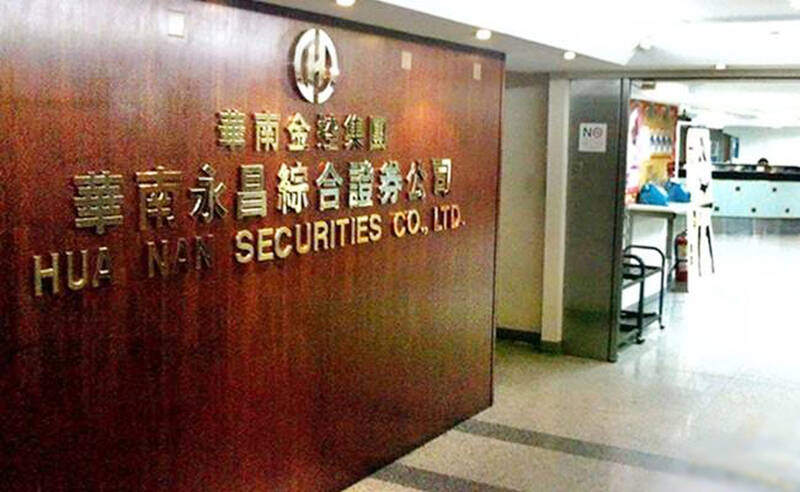Hua Nan Investment Trust Co (華南永昌投信), the asset management arm of Hua Nan Financial Holdings Co (華南金控), has written off deferred tax assets linked to its exposure to the long-running Private Equity Management Group (PEM) fraud case, citing little chance of recovery.
The move pushed the unit’s accumulated losses to NT$156 million (US$5.13 million) as of Aug. 31, exceeding half of its paid-in capital, Hua Nan Financial said earlier this week.
Local financial regulations stipulate that the breach disqualifies the company from issuing new funds unless it receives a fresh capital injection.

Photo: Chen Mei-ying, Taipei Times
The losses stem from Hua Nan Investment Trust’s earlier involvement in the PEM investment scandal, in which Taiwanese investors lost hundreds of millions of New Taiwan dollars.
The case, dubbed “Taiwan’s Madoff scandal,” dates to 2006 and 2007, when Taiwanese-American financier Danny Pang (彭日成) marketed structured notes in Taiwan, promising principal protection and annual returns of 6 to 8 percent.
The products were distributed through several local and foreign financial institutions, including Hua Nan Commercial Bank (華南銀行), Standard Chartered Bank, Taichung Commercial Bank Co (台中商銀), Bank SinoPac (永豐銀行) and Hua Nan Investment Trust.
To address the erosion of capital, Hua Nan Financial said that it plans to carry out a capital reduction followed by a capital injection to boost the subsidiary’s net asset value.
The process is expected to be completed by the end of this year, it said.
The recapitalization would ensure the trust’s net worth returns to NT$10 per share, the parent company said, adding that the one-off losses would not affect the subsidiary’s operations or its business development.

In Italy’s storied gold-making hubs, jewelers are reworking their designs to trim gold content as they race to blunt the effect of record prices and appeal to shoppers watching their budgets. Gold prices hit a record high on Thursday, surging near US$5,600 an ounce, more than double a year ago as geopolitical concerns and jitters over trade pushed investors toward the safe-haven asset. The rally is putting undue pressure on small artisans as they face mounting demands from customers, including international brands, to produce cheaper items, from signature pieces to wedding rings, according to interviews with four independent jewelers in Italy’s main

Japanese Prime Minister Sanae Takaichi has talked up the benefits of a weaker yen in a campaign speech, adopting a tone at odds with her finance ministry, which has refused to rule out any options to counter excessive foreign exchange volatility. Takaichi later softened her stance, saying she did not have a preference for the yen’s direction. “People say the weak yen is bad right now, but for export industries, it’s a major opportunity,” Takaichi said on Saturday at a rally for Liberal Democratic Party candidate Daishiro Yamagiwa in Kanagawa Prefecture ahead of a snap election on Sunday. “Whether it’s selling food or

CONCERNS: Tech companies investing in AI businesses that purchase their products have raised questions among investors that they are artificially propping up demand Nvidia Corp chief executive officer Jensen Huang (黃仁勳) on Saturday said that the company would be participating in OpenAI’s latest funding round, describing it as potentially “the largest investment we’ve ever made.” “We will invest a great deal of money,” Huang told reporters while visiting Taipei. “I believe in OpenAI. The work that they do is incredible. They’re one of the most consequential companies of our time.” Huang did not say exactly how much Nvidia might contribute, but described the investment as “huge.” “Let Sam announce how much he’s going to raise — it’s for him to decide,” Huang said, referring to OpenAI

The global server market is expected to grow 12.8 percent annually this year, with artificial intelligence (AI) servers projected to account for 16.5 percent, driven by continued investment in AI infrastructure by major cloud service providers (CSPs), market researcher TrendForce Corp (集邦科技) said yesterday. Global AI server shipments this year are expected to increase 28 percent year-on-year to more than 2.7 million units, driven by sustained demand from CSPs and government sovereign cloud projects, TrendForce analyst Frank Kung (龔明德) told the Taipei Times. Demand for GPU-based AI servers, including Nvidia Corp’s GB and Vera Rubin rack systems, is expected to remain high,